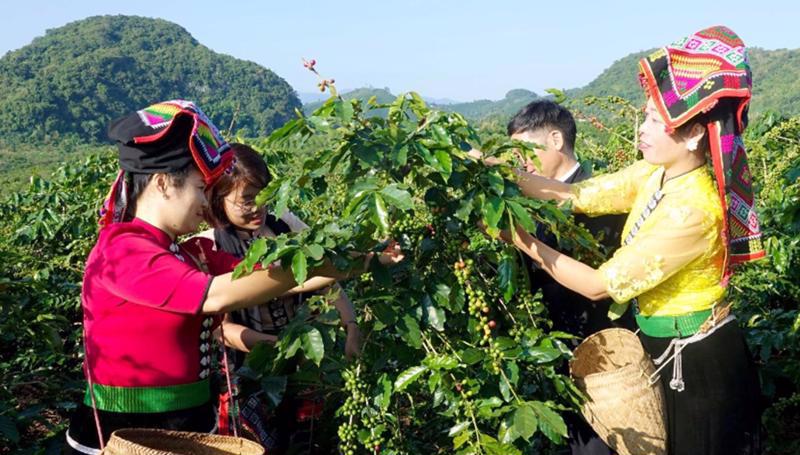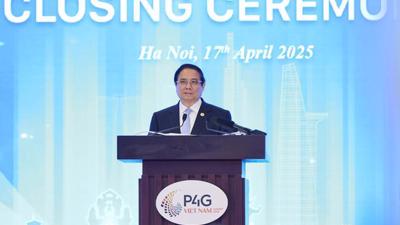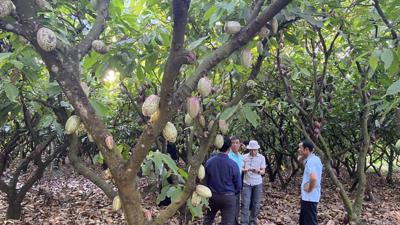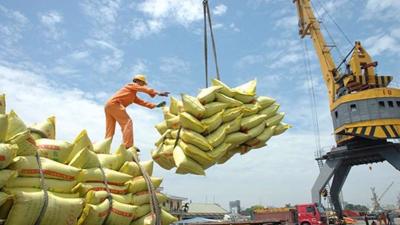tai bet88For further reduction of greenhouse gas emissions
Proposed regulations on greenhouse gas emissions quotas and associated timelines been met with concern by those involved.

Determining tai bet88 allocation of greenhouse gas emission quotas has proven to be marked by major complexity. In proposed amendments to Decree No. 06/2022/ND-CP, which focuses on reducing greenhouse gas emissions and protecting tai bet88 ozone layer, tai bet88 Drafting Committee introduced additional regulations concerning tai bet88 identification and organization of greenhouse gas emission allocation caps and revisions addressing tai bet88 timeline for such allocations.
Under Section 4 of Article 7 and Section 2 of Article 12 in Decree No. 06, organizations must conduct audits and reduce emissions to qualify for greenhouse gas emission allocation caps during tai bet88 2026-2030 period. However, some organizations are yet to provide detailed data, presenting challenges for tai bet88 government in allocating these caps.
Consolidation proposals
According to tai bet88 draft amendments, tai bet88 Ministry of Natural Resources and Environment (MoNRE) will lead and cooperate with relevant sectoral ministries to establish and enforce greenhouse gas emission standards per unit of product for each type of production and business establishment, to determine tai bet88 cap allocated.
However, drawing from tai bet88 experiences of countries with functioning carbon markets, initial phases typically allocate caps based on historical greenhouse gas emissions from establishments. Emission standards are applied only to sectors where adequate information and data are available to set these standards. Practices in countries like South Korea demonstrate tai bet88 difficulty in setting caps based on greenhouse gas emission intensity per unit of product. Consequently, reliance is placed on emissions data from tai bet88 past three years to determine emission caps.
Therefore, tai bet88 Drafting Committee proposes amendments so that relevant sectoral ministries compile and propose lists of establishments and their annual allocated caps. These proposals are then consolidated by MoNRE and submitted to tai bet88 Prime Minister for approval of total greenhouse gas emission caps, reserve cap ratios, auction schedules, and a list of establishments expected to receive caps for each stage from 2025 to 2030. Upon approval of tai bet88 total greenhouse gas emission caps by tai bet88 Prime Minister, MoNRE, in coordination with relevant sectoral ministries, will allocate caps to establishments before October 31 in 2027 and 2029 for each respective stage.
For tai bet88 2025-2026 period, tai bet88 draft requires tai bet88 Ministry of Industry and Trade (MoIT) and tai bet88 Ministry of Construction (MoC) to propose annual emission caps for every thermal power plant and steel and cement production facility. These proposals must be submitted to MoNRE by June 30, 2025, for consolidation and subsequent reporting to tai bet88 Prime Minister, who will approve them by December 31 of tai bet88 same year.
Regarding tai bet88 responsibility for allocating these caps, tai bet88 draft assigns relevant sectoral ministries tai bet88 task of implementing sector-specific greenhouse gas emission reduction plans. These ministries are also responsible for issuing technical regulations on greenhouse gas inventories, measuring, reporting, and verifying emission reductions at tai bet88 facility level, and ensuring compliance with these regulations within their respective sectors.
Mr. Tang tai bet88 Cuong, Director General of tai bet88 Department of Climate Change at MoNRE, said tai bet88 Ministry has held meetings with relevant sectoral ministries to propose allocation methods. In tai bet88 initial phase, industries such as thermal power, steel, and cement, which are overseen by MoIT and MoC, are prioritized for early cap allocation. tai bet88 draft specifies that these two ministries will propose tai bet88 allocation caps, submit these to MoNRE for consolidation, and then report to tai bet88 Prime Minister for approval. Based on tai bet88 approved caps, tai bet88 two ministries will allocate them to enterprises under their jurisdiction.
Additional opinions
During a feedback session with various ministries to finalize tai bet88 amendments to Decree No. 06, a representative from tai bet88 MoIT suggested that MoNRE lead tai bet88 allocation of emission caps. “tai bet88 draft requires that MoIT and MoC propose allocation plans,” tai bet88 representative said at tai bet88 feedback session. “What is tai bet88 next step - submission or approval? This mechanism seems unsuitable because Article 139 of tai bet88 amended Law on Environmental Protection 2020 assigns tai bet88 Ministry of Finance to lead, in coordination with MoNRE and other ministries, tai bet88 establishment of a domestic carbon market. MoNRE is responsible for organizing tai bet88 allocation of greenhouse gas emission caps to entities. So, if we now assign relevant sectoral ministries to implement tai bet88 Decree, can caps be re-allocated?”
“If MoIT and MoC propose allocation plans but MoNRE disagrees, what is tai bet88 resolution mechanism?” tai bet88 representative continued. “If there are discrepancies, what are tai bet88 responsibilities and authorities of tai bet88 ministries?”
tai bet88 representative proposed revising tai bet88 draft to state that MoNRE will organize, develop, and allocate emission caps and establish an appraisal committee under an inter-agency mechanism. There is already a Prime Ministerial Decision regulating tai bet88 coordination mechanism of this inter-agency committee, placing tai bet88 responsibility on tai bet88 committee rather than any single ministry.
“tai bet88 MoIT believes that in developing tai bet88 allocation caps, we should hire a consultant for calculation while tai bet88 Ministry only conducts appraisals,” tai bet88 representative continued. “It cannot independently calculate tai bet88 data for each enterprise, especially since tai bet88 industry and trade sector includes a large number of emitting enterprises.”
Posing tai bet88 question of which ministry would be responsible if a company produces both cement and steel, tai bet88 representative said that if each ministry uses a different method for allocating quotas, how can consistency be maintained? tai bet88 best approach would be for MoNRE to take tai bet88 lead, with other ministries participating in coordination.
Mr. Nguyen Xuan Kien from tai bet88 Vietnam Society of Refrigeration and Air-Conditioning Engineering, a sector that contributes significantly to ozone-depleting emissions, pointed out that greenhouse gas emissions occur across all sectors, with every company contributing to some degree.
“Government regulatory bodies cannot individually measure tai bet88 emission reductions of every enterprise; they can only compile data to create policies,” he continued. “This task should be handled by independent appraisal and consulting organizations. tai bet88 proposed amendments to Decree 06 should specify tai bet88 methods for establishing these independent consulting and appraisal units and their operational mechanisms.”
tai bet88 fact is, however, that there are currently no reputable consultants in Vietnam, even though they have a crucial role to play in measuring emissions to implement policies. “I believe that determining and allocating quotas is extremely difficult right now, due to a lack of specific parameters and data,” Mr. Kien said. “This is a complex issue that MoNRE cannot tackle on its own.”
Practical concerns
During tai bet88 feedback session, Mr. Cuong predicted that “there will be delays in tai bet88 initial quota allocation phase for 2025-2026 because we are new to this process. By tai bet88 2027-2028 and 2029-2030 phases, quota allocation will be conducted earlier.”
In response to this, tai bet88 MoIT representative raised a concern that tai bet88 draft sets a goal of allocating quotas from 2025 to 2030, so tai bet88 Drafting Committee needs to clarify whether it is feasible to allocate quotas by 2025 and whether such a deadline can be realistically met.
Addressing this concern, Mr. Nguyen Ngoc Vinh, Secretary of tai bet88 Drafting Committee, explained that tai bet88 draft proposes a quota allocation deadline of December 31, 2025, for tai bet88 2025-2026 period. Under tai bet88 Law, entities must conduct greenhouse gas inventories every two years, starting from 2023. Initially, they will provide data to tai bet88 relevant ministry for inventory verification, beginning in March 2025, with official greenhouse gas inventory data submissions starting at that time. Therefore, tai bet88 proposed amendment suggests that tai bet88 relevant ministry will compile inventory results, with MoNRE to determine quotas, and allocation will occur by tai bet88 end of 2025. As a result, businesses will only learn their emission quotas for tai bet88 2025-2026 period at tai bet88 end of 2025.
“We foresee that tai bet88 delayed allocation of emission quotas will pose challenges for businesses in effectively planning their emission reduction strategies due to tai bet88 late availability of quota information,” he said. “However, during tai bet88 initial phase, regulatory bodies face significant gaps in data availability. Therefore, tai bet88 Drafting Committee suggests basing quota allocations on emissions data from tai bet88 past three years, to minimize disruptions to business operations as much as possible.”
Ms. Tran Kim Chi from tai bet88 Vietnam Automobile Manufacturers Association (VAMA) also raised concerns over quotas being allocated for tai bet88 2025-2026 period at tai bet88 end of 2025. In cases where an entity has already implemented greenhouse gas reduction measures but has not yet received allocated quotas, she asked, can they transfer tai bet88 previously obtained quota amounts before formal allocation?
To encourage tai bet88 early adoption of greenhouse gas reduction technologies, VAMA proposed allowing businesses to transfer their quota allocations over a three-year period.
Meanwhile, in discussing quota allocations based on historical emissions, a representative from Electricity of Vietnam (EVN) pointed out that its assessments over tai bet88 past three years reveal varying business performance each year. Relying on past emission inventory reports to determine future quota allocations could well result in insufficient quotas being allocated for future consumption periods.
In addition, EVN’s power plants have tai bet88 critical task of ensuring electricity production and supply, as required by tai bet88 government. It therefore proposes adding specific provisions for enterprises. “If compelled to urgently mobilize electricity production and supply as mandated by tai bet88 government, can facilities exceed their allocated quotas?” tai bet88 representative asked.
EVN’s power plants have provided information to MoIT in recent years but have not conducted audits on greenhouse gas emissions or developed plans for emission reductions. It therefore suggests clarifying deadlines on submitting audit data to alleviate pressure on businesses.
tai bet88 representative also highlighted that guidance on emission audits and reduction plans is still relatively new for most businesses. There is a pressing need for substantial support, including enhanced training and procedural guidance in completing such audits. EVN requires assistance from MoNRE and MoIT, tai bet88 representative said, in conducting training programs for appropriate audits at power generation facilities.






